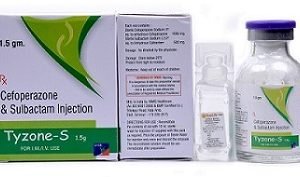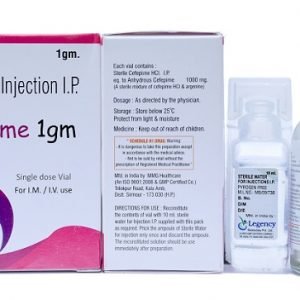Description
RABEPRAZOLE
Rabeprazole is used to treat certain stomach and esophagus problems (such as acid reflux, ulcers). It works by decreasing the amount of acid your stomach makes. It relieves symptoms such as heartburn, difficulty swallowing, and persistent cough.
PHARMACOLOGY
PHARMACODYNAMICS:
Mechanism of Action: – Rabeprazole sodium belongs to the class of anti-secretory compounds, the substituted benzimidazole that do not exhibit anticholinergic or H2 histamine antagonist properties, but suppress gastric acid secretion by the specific inhibition of the H+/K+-ATPase enzyme (the acid or proton pump). The effect is dose-related and leads to inhibition of both basal and stimulated acid secretion irrespective of the stimulus. As a weak base, rabeprazole is rapidly absorbed following all doses and is concentrated in the acidic environment of the parietal cells. Rabeprazole is converted to the active sulphenamide form through protonation and it subsequently reacts with the available cysteines on the proton pump.
Anti-secretory Activity: – After oral administration of a 20 mg dose of rabeprazole sodium the onset of the anti-secretory effect occurs within one hour, with the maximum effect occurring within two to four hours. The inhibitory effect of rabeprazole sodium on acid secretion increases slightly with repeated once-daily dosing, achieving steady state inhibition after three days. When the drug is discontinued, secretory activity normalises over 2 to 3 days.
PHARMACOKINETICS:
- Absorption: – Since rabeprazole is acid-labile, it is administered as a delayed-release tablet so that it can pass through the stomach relatively intact. Once rabeprazole has left the stomach, absorption occurs within 1 hour of administration. The bioavailability is approximately 52%.
- Distribution: – Distributed in tissue, particularly gastric parietal cells.
- Protein Binding: – Very high; approximately 96% bound to human plasma protein.
- Biotransformation: Rabeprazole is extensively metabolized in the liver by the cytochrome P450 enzyme system to 2 main metabolites. These 2 metabolites do not have any significant antisecretory activity.
- Elimination: – Normal renal function: Approximately 1 to 2 hours. Hepatic function impairment: 2 to 6 hours.
INDICATIONS
Gastric ulcer (GU)
- Peptic ulcer disease (PUD).
- Maintenance of healing of erosive or ulcerative GERD.
- Healing of erosive and ulcerative GERD.
- Healing of duodenal ulcers.
- Treatment of symptomatic GERD.
- Treatment of pathological hypersecretory conditions (Zollinger-Ellison syndrome).
- Helicobacter pylori eradication to reduce risk of duodenal ulcer recurrence.














